A Critical Analysis of Management Theory and Practice Theories
VerifiedAdded on 2020/05/04
|11
|2774
|84
Essay
AI Summary
This essay provides a critical analysis of management theories and practices, focusing on resource dependency theory, institutional theory, and population ecology. The essay explores how these theories shape organizational behavior, examining the concepts of strategic choice and determinism. Resource dependency theory highlights the impact of external factors and interdependencies on organizations, emphasizing how organizations manage their dependencies to maintain power. Institutional theory delves into the influence of social structures and institutions on organizational practices, exploring how organizations adopt institutional frameworks to achieve legitimacy and stability. Population ecology theory examines the dynamics of organizational populations, focusing on the processes of selection and replacement within the environment and the factors affecting organizational survival and change. The essay provides a holistic view of the relevance and importance of these theories in determining organizational actions and behaviors.
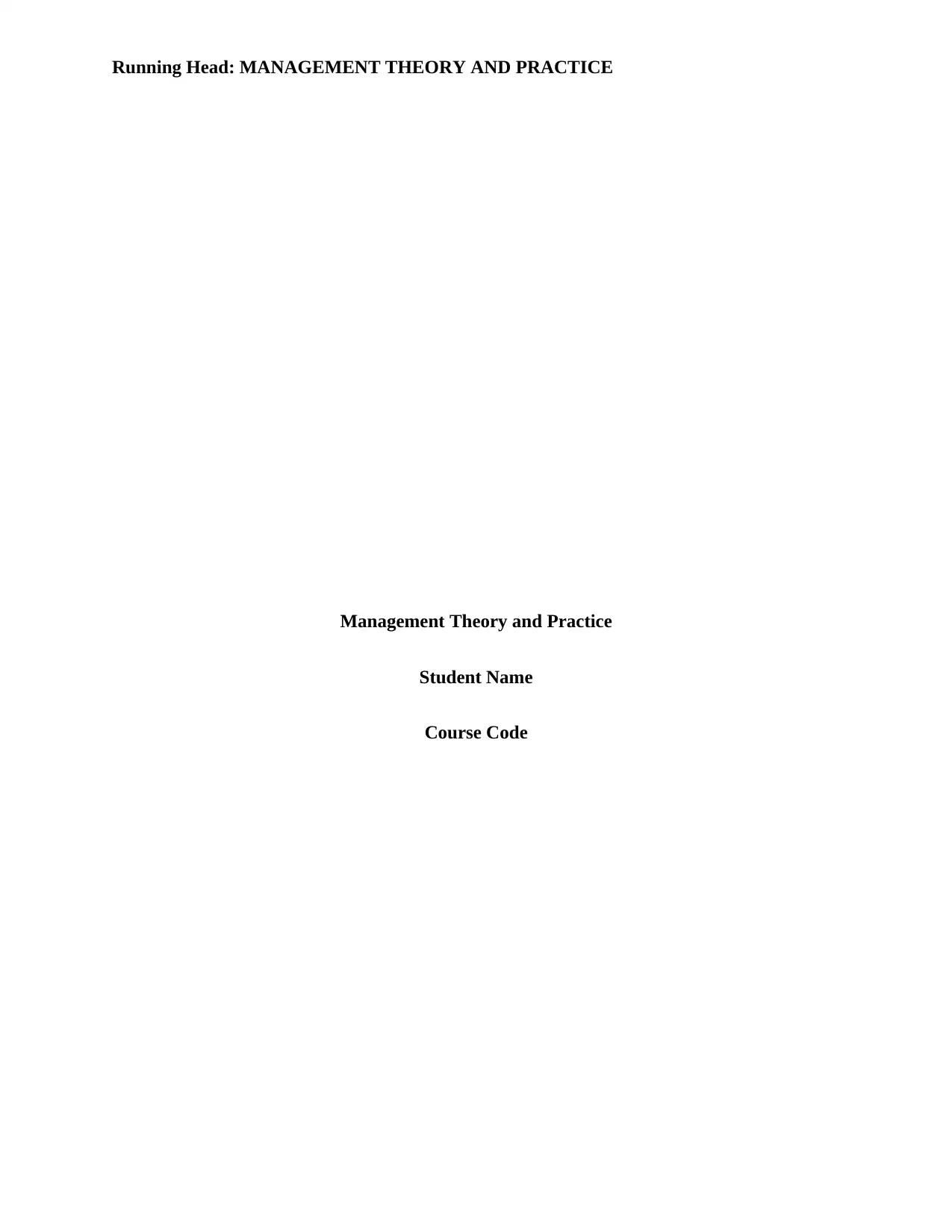
Running Head: MANAGEMENT THEORY AND PRACTICE
Management Theory and Practice
Student Name
Course Code
Management Theory and Practice
Student Name
Course Code
Paraphrase This Document
Need a fresh take? Get an instant paraphrase of this document with our AI Paraphraser
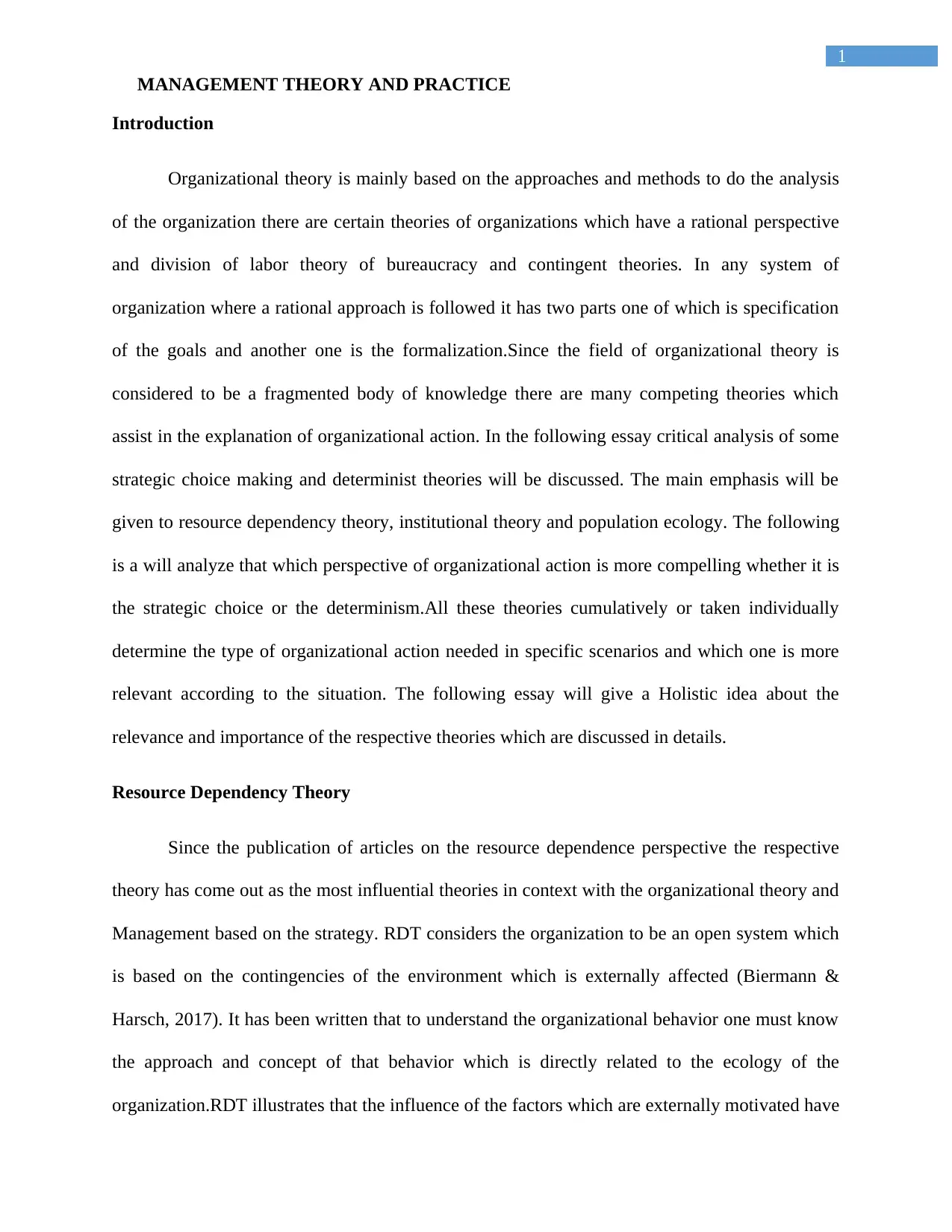
1
MANAGEMENT THEORY AND PRACTICE
Introduction
Organizational theory is mainly based on the approaches and methods to do the analysis
of the organization there are certain theories of organizations which have a rational perspective
and division of labor theory of bureaucracy and contingent theories. In any system of
organization where a rational approach is followed it has two parts one of which is specification
of the goals and another one is the formalization.Since the field of organizational theory is
considered to be a fragmented body of knowledge there are many competing theories which
assist in the explanation of organizational action. In the following essay critical analysis of some
strategic choice making and determinist theories will be discussed. The main emphasis will be
given to resource dependency theory, institutional theory and population ecology. The following
is a will analyze that which perspective of organizational action is more compelling whether it is
the strategic choice or the determinism.All these theories cumulatively or taken individually
determine the type of organizational action needed in specific scenarios and which one is more
relevant according to the situation. The following essay will give a Holistic idea about the
relevance and importance of the respective theories which are discussed in details.
Resource Dependency Theory
Since the publication of articles on the resource dependence perspective the respective
theory has come out as the most influential theories in context with the organizational theory and
Management based on the strategy. RDT considers the organization to be an open system which
is based on the contingencies of the environment which is externally affected (Biermann &
Harsch, 2017). It has been written that to understand the organizational behavior one must know
the approach and concept of that behavior which is directly related to the ecology of the
organization.RDT illustrates that the influence of the factors which are externally motivated have
MANAGEMENT THEORY AND PRACTICE
Introduction
Organizational theory is mainly based on the approaches and methods to do the analysis
of the organization there are certain theories of organizations which have a rational perspective
and division of labor theory of bureaucracy and contingent theories. In any system of
organization where a rational approach is followed it has two parts one of which is specification
of the goals and another one is the formalization.Since the field of organizational theory is
considered to be a fragmented body of knowledge there are many competing theories which
assist in the explanation of organizational action. In the following essay critical analysis of some
strategic choice making and determinist theories will be discussed. The main emphasis will be
given to resource dependency theory, institutional theory and population ecology. The following
is a will analyze that which perspective of organizational action is more compelling whether it is
the strategic choice or the determinism.All these theories cumulatively or taken individually
determine the type of organizational action needed in specific scenarios and which one is more
relevant according to the situation. The following essay will give a Holistic idea about the
relevance and importance of the respective theories which are discussed in details.
Resource Dependency Theory
Since the publication of articles on the resource dependence perspective the respective
theory has come out as the most influential theories in context with the organizational theory and
Management based on the strategy. RDT considers the organization to be an open system which
is based on the contingencies of the environment which is externally affected (Biermann &
Harsch, 2017). It has been written that to understand the organizational behavior one must know
the approach and concept of that behavior which is directly related to the ecology of the
organization.RDT illustrates that the influence of the factors which are externally motivated have
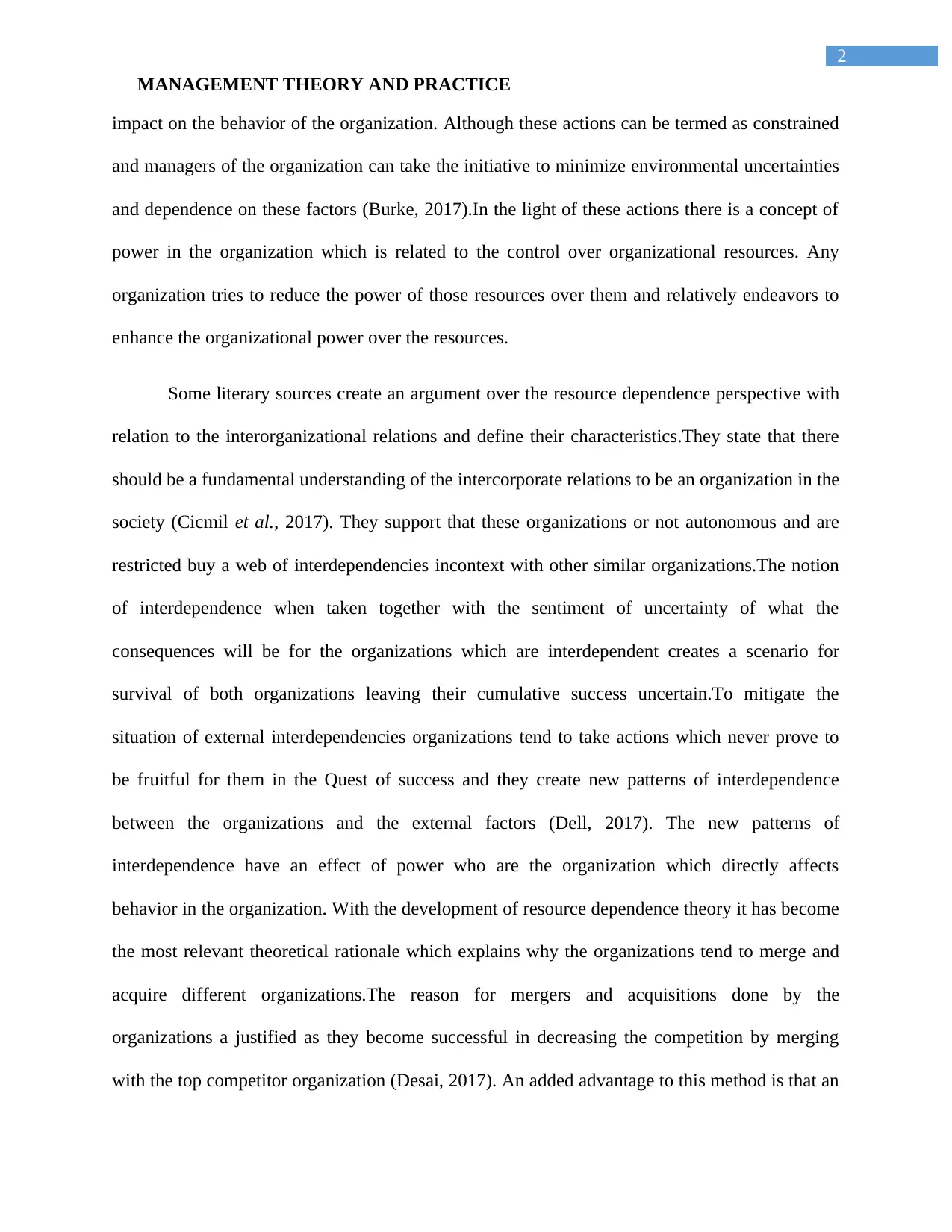
2
MANAGEMENT THEORY AND PRACTICE
impact on the behavior of the organization. Although these actions can be termed as constrained
and managers of the organization can take the initiative to minimize environmental uncertainties
and dependence on these factors (Burke, 2017).In the light of these actions there is a concept of
power in the organization which is related to the control over organizational resources. Any
organization tries to reduce the power of those resources over them and relatively endeavors to
enhance the organizational power over the resources.
Some literary sources create an argument over the resource dependence perspective with
relation to the interorganizational relations and define their characteristics.They state that there
should be a fundamental understanding of the intercorporate relations to be an organization in the
society (Cicmil et al., 2017). They support that these organizations or not autonomous and are
restricted buy a web of interdependencies incontext with other similar organizations.The notion
of interdependence when taken together with the sentiment of uncertainty of what the
consequences will be for the organizations which are interdependent creates a scenario for
survival of both organizations leaving their cumulative success uncertain.To mitigate the
situation of external interdependencies organizations tend to take actions which never prove to
be fruitful for them in the Quest of success and they create new patterns of interdependence
between the organizations and the external factors (Dell, 2017). The new patterns of
interdependence have an effect of power who are the organization which directly affects
behavior in the organization. With the development of resource dependence theory it has become
the most relevant theoretical rationale which explains why the organizations tend to merge and
acquire different organizations.The reason for mergers and acquisitions done by the
organizations a justified as they become successful in decreasing the competition by merging
with the top competitor organization (Desai, 2017). An added advantage to this method is that an
MANAGEMENT THEORY AND PRACTICE
impact on the behavior of the organization. Although these actions can be termed as constrained
and managers of the organization can take the initiative to minimize environmental uncertainties
and dependence on these factors (Burke, 2017).In the light of these actions there is a concept of
power in the organization which is related to the control over organizational resources. Any
organization tries to reduce the power of those resources over them and relatively endeavors to
enhance the organizational power over the resources.
Some literary sources create an argument over the resource dependence perspective with
relation to the interorganizational relations and define their characteristics.They state that there
should be a fundamental understanding of the intercorporate relations to be an organization in the
society (Cicmil et al., 2017). They support that these organizations or not autonomous and are
restricted buy a web of interdependencies incontext with other similar organizations.The notion
of interdependence when taken together with the sentiment of uncertainty of what the
consequences will be for the organizations which are interdependent creates a scenario for
survival of both organizations leaving their cumulative success uncertain.To mitigate the
situation of external interdependencies organizations tend to take actions which never prove to
be fruitful for them in the Quest of success and they create new patterns of interdependence
between the organizations and the external factors (Dell, 2017). The new patterns of
interdependence have an effect of power who are the organization which directly affects
behavior in the organization. With the development of resource dependence theory it has become
the most relevant theoretical rationale which explains why the organizations tend to merge and
acquire different organizations.The reason for mergers and acquisitions done by the
organizations a justified as they become successful in decreasing the competition by merging
with the top competitor organization (Desai, 2017). An added advantage to this method is that an
⊘ This is a preview!⊘
Do you want full access?
Subscribe today to unlock all pages.

Trusted by 1+ million students worldwide
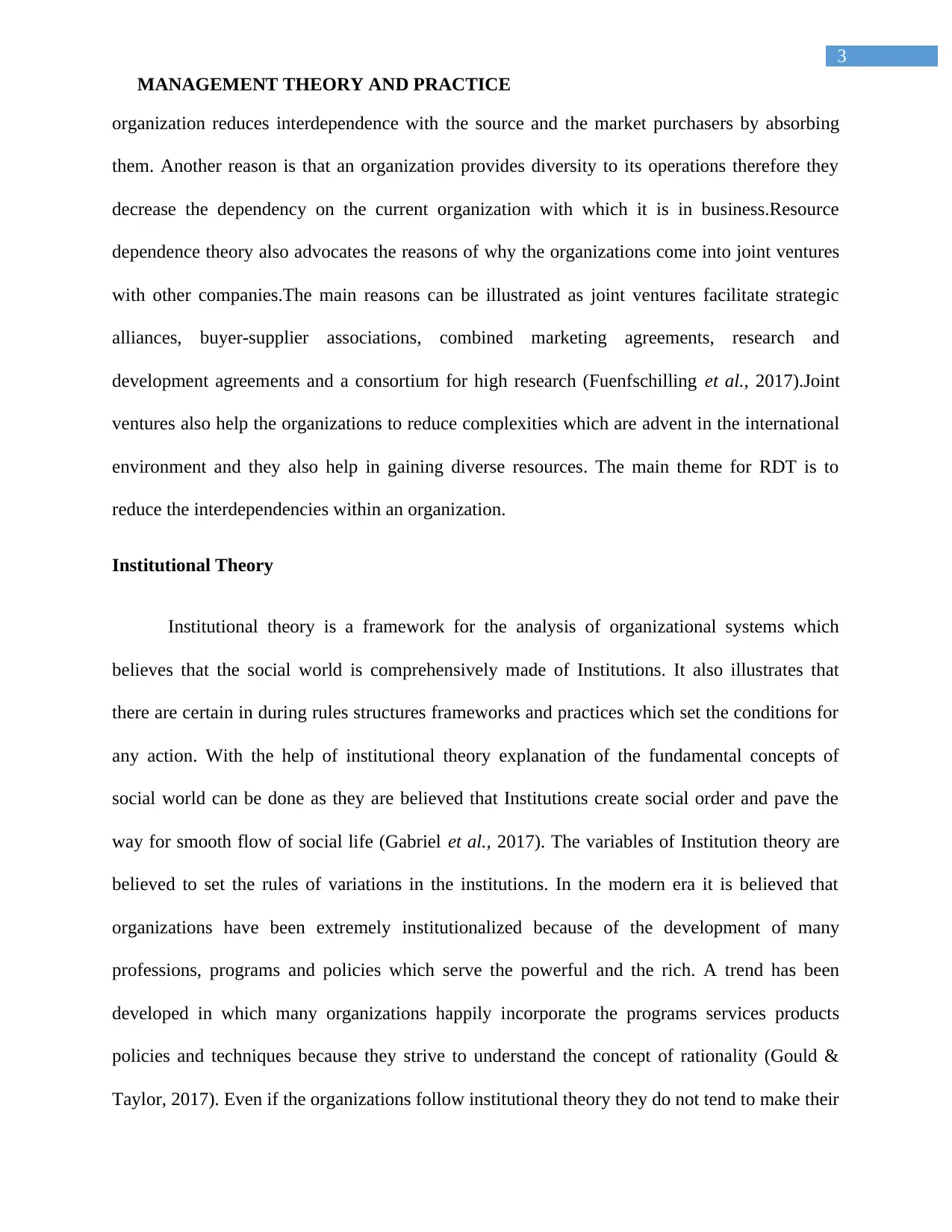
3
MANAGEMENT THEORY AND PRACTICE
organization reduces interdependence with the source and the market purchasers by absorbing
them. Another reason is that an organization provides diversity to its operations therefore they
decrease the dependency on the current organization with which it is in business.Resource
dependence theory also advocates the reasons of why the organizations come into joint ventures
with other companies.The main reasons can be illustrated as joint ventures facilitate strategic
alliances, buyer-supplier associations, combined marketing agreements, research and
development agreements and a consortium for high research (Fuenfschilling et al., 2017).Joint
ventures also help the organizations to reduce complexities which are advent in the international
environment and they also help in gaining diverse resources. The main theme for RDT is to
reduce the interdependencies within an organization.
Institutional Theory
Institutional theory is a framework for the analysis of organizational systems which
believes that the social world is comprehensively made of Institutions. It also illustrates that
there are certain in during rules structures frameworks and practices which set the conditions for
any action. With the help of institutional theory explanation of the fundamental concepts of
social world can be done as they are believed that Institutions create social order and pave the
way for smooth flow of social life (Gabriel et al., 2017). The variables of Institution theory are
believed to set the rules of variations in the institutions. In the modern era it is believed that
organizations have been extremely institutionalized because of the development of many
professions, programs and policies which serve the powerful and the rich. A trend has been
developed in which many organizations happily incorporate the programs services products
policies and techniques because they strive to understand the concept of rationality (Gould &
Taylor, 2017). Even if the organizations follow institutional theory they do not tend to make their
MANAGEMENT THEORY AND PRACTICE
organization reduces interdependence with the source and the market purchasers by absorbing
them. Another reason is that an organization provides diversity to its operations therefore they
decrease the dependency on the current organization with which it is in business.Resource
dependence theory also advocates the reasons of why the organizations come into joint ventures
with other companies.The main reasons can be illustrated as joint ventures facilitate strategic
alliances, buyer-supplier associations, combined marketing agreements, research and
development agreements and a consortium for high research (Fuenfschilling et al., 2017).Joint
ventures also help the organizations to reduce complexities which are advent in the international
environment and they also help in gaining diverse resources. The main theme for RDT is to
reduce the interdependencies within an organization.
Institutional Theory
Institutional theory is a framework for the analysis of organizational systems which
believes that the social world is comprehensively made of Institutions. It also illustrates that
there are certain in during rules structures frameworks and practices which set the conditions for
any action. With the help of institutional theory explanation of the fundamental concepts of
social world can be done as they are believed that Institutions create social order and pave the
way for smooth flow of social life (Gabriel et al., 2017). The variables of Institution theory are
believed to set the rules of variations in the institutions. In the modern era it is believed that
organizations have been extremely institutionalized because of the development of many
professions, programs and policies which serve the powerful and the rich. A trend has been
developed in which many organizations happily incorporate the programs services products
policies and techniques because they strive to understand the concept of rationality (Gould &
Taylor, 2017). Even if the organizations follow institutional theory they do not tend to make their
Paraphrase This Document
Need a fresh take? Get an instant paraphrase of this document with our AI Paraphraser
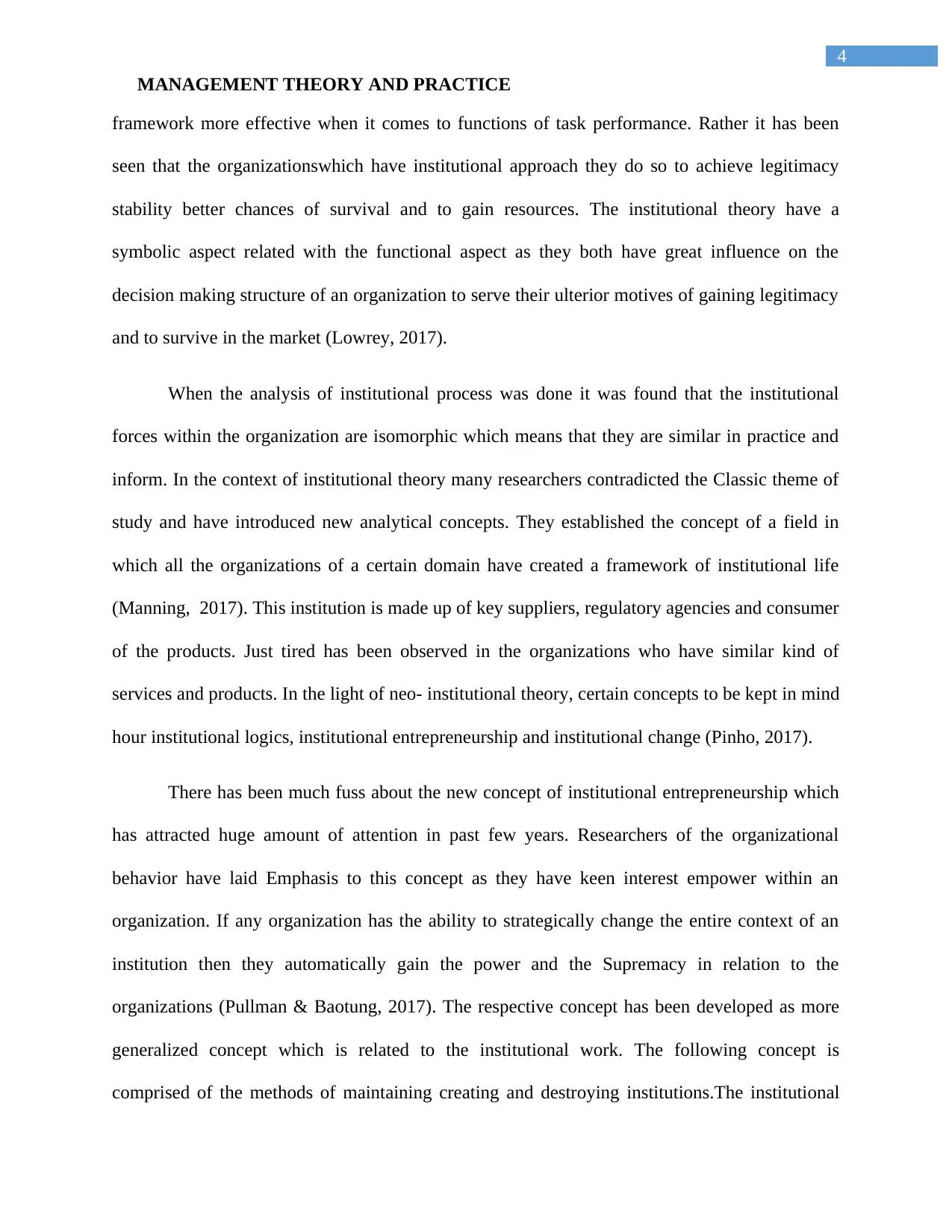
4
MANAGEMENT THEORY AND PRACTICE
framework more effective when it comes to functions of task performance. Rather it has been
seen that the organizationswhich have institutional approach they do so to achieve legitimacy
stability better chances of survival and to gain resources. The institutional theory have a
symbolic aspect related with the functional aspect as they both have great influence on the
decision making structure of an organization to serve their ulterior motives of gaining legitimacy
and to survive in the market (Lowrey, 2017).
When the analysis of institutional process was done it was found that the institutional
forces within the organization are isomorphic which means that they are similar in practice and
inform. In the context of institutional theory many researchers contradicted the Classic theme of
study and have introduced new analytical concepts. They established the concept of a field in
which all the organizations of a certain domain have created a framework of institutional life
(Manning, 2017). This institution is made up of key suppliers, regulatory agencies and consumer
of the products. Just tired has been observed in the organizations who have similar kind of
services and products. In the light of neo- institutional theory, certain concepts to be kept in mind
hour institutional logics, institutional entrepreneurship and institutional change (Pinho, 2017).
There has been much fuss about the new concept of institutional entrepreneurship which
has attracted huge amount of attention in past few years. Researchers of the organizational
behavior have laid Emphasis to this concept as they have keen interest empower within an
organization. If any organization has the ability to strategically change the entire context of an
institution then they automatically gain the power and the Supremacy in relation to the
organizations (Pullman & Baotung, 2017). The respective concept has been developed as more
generalized concept which is related to the institutional work. The following concept is
comprised of the methods of maintaining creating and destroying institutions.The institutional
MANAGEMENT THEORY AND PRACTICE
framework more effective when it comes to functions of task performance. Rather it has been
seen that the organizationswhich have institutional approach they do so to achieve legitimacy
stability better chances of survival and to gain resources. The institutional theory have a
symbolic aspect related with the functional aspect as they both have great influence on the
decision making structure of an organization to serve their ulterior motives of gaining legitimacy
and to survive in the market (Lowrey, 2017).
When the analysis of institutional process was done it was found that the institutional
forces within the organization are isomorphic which means that they are similar in practice and
inform. In the context of institutional theory many researchers contradicted the Classic theme of
study and have introduced new analytical concepts. They established the concept of a field in
which all the organizations of a certain domain have created a framework of institutional life
(Manning, 2017). This institution is made up of key suppliers, regulatory agencies and consumer
of the products. Just tired has been observed in the organizations who have similar kind of
services and products. In the light of neo- institutional theory, certain concepts to be kept in mind
hour institutional logics, institutional entrepreneurship and institutional change (Pinho, 2017).
There has been much fuss about the new concept of institutional entrepreneurship which
has attracted huge amount of attention in past few years. Researchers of the organizational
behavior have laid Emphasis to this concept as they have keen interest empower within an
organization. If any organization has the ability to strategically change the entire context of an
institution then they automatically gain the power and the Supremacy in relation to the
organizations (Pullman & Baotung, 2017). The respective concept has been developed as more
generalized concept which is related to the institutional work. The following concept is
comprised of the methods of maintaining creating and destroying institutions.The institutional
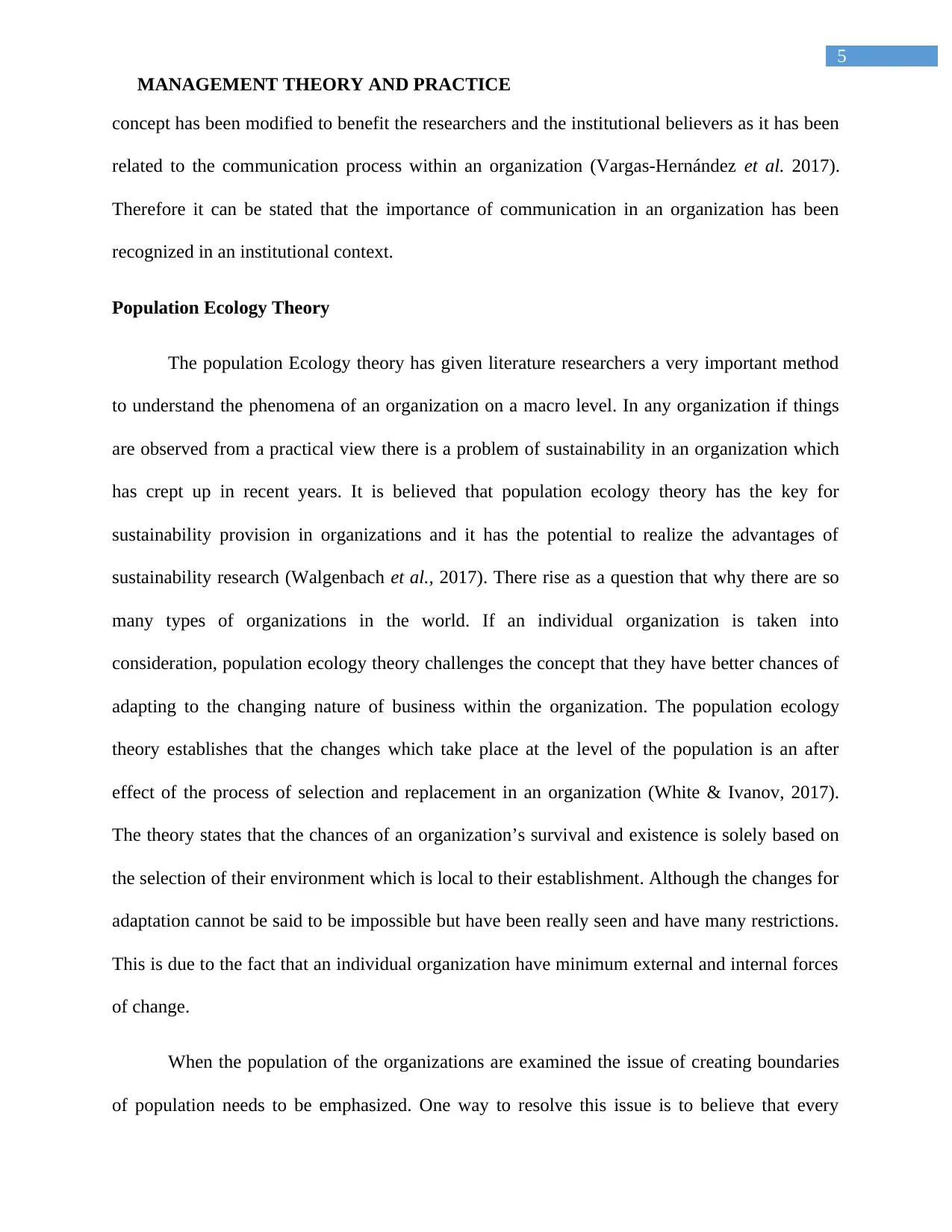
5
MANAGEMENT THEORY AND PRACTICE
concept has been modified to benefit the researchers and the institutional believers as it has been
related to the communication process within an organization (Vargas-Hernández et al. 2017).
Therefore it can be stated that the importance of communication in an organization has been
recognized in an institutional context.
Population Ecology Theory
The population Ecology theory has given literature researchers a very important method
to understand the phenomena of an organization on a macro level. In any organization if things
are observed from a practical view there is a problem of sustainability in an organization which
has crept up in recent years. It is believed that population ecology theory has the key for
sustainability provision in organizations and it has the potential to realize the advantages of
sustainability research (Walgenbach et al., 2017). There rise as a question that why there are so
many types of organizations in the world. If an individual organization is taken into
consideration, population ecology theory challenges the concept that they have better chances of
adapting to the changing nature of business within the organization. The population ecology
theory establishes that the changes which take place at the level of the population is an after
effect of the process of selection and replacement in an organization (White & Ivanov, 2017).
The theory states that the chances of an organization’s survival and existence is solely based on
the selection of their environment which is local to their establishment. Although the changes for
adaptation cannot be said to be impossible but have been really seen and have many restrictions.
This is due to the fact that an individual organization have minimum external and internal forces
of change.
When the population of the organizations are examined the issue of creating boundaries
of population needs to be emphasized. One way to resolve this issue is to believe that every
MANAGEMENT THEORY AND PRACTICE
concept has been modified to benefit the researchers and the institutional believers as it has been
related to the communication process within an organization (Vargas-Hernández et al. 2017).
Therefore it can be stated that the importance of communication in an organization has been
recognized in an institutional context.
Population Ecology Theory
The population Ecology theory has given literature researchers a very important method
to understand the phenomena of an organization on a macro level. In any organization if things
are observed from a practical view there is a problem of sustainability in an organization which
has crept up in recent years. It is believed that population ecology theory has the key for
sustainability provision in organizations and it has the potential to realize the advantages of
sustainability research (Walgenbach et al., 2017). There rise as a question that why there are so
many types of organizations in the world. If an individual organization is taken into
consideration, population ecology theory challenges the concept that they have better chances of
adapting to the changing nature of business within the organization. The population ecology
theory establishes that the changes which take place at the level of the population is an after
effect of the process of selection and replacement in an organization (White & Ivanov, 2017).
The theory states that the chances of an organization’s survival and existence is solely based on
the selection of their environment which is local to their establishment. Although the changes for
adaptation cannot be said to be impossible but have been really seen and have many restrictions.
This is due to the fact that an individual organization have minimum external and internal forces
of change.
When the population of the organizations are examined the issue of creating boundaries
of population needs to be emphasized. One way to resolve this issue is to believe that every
⊘ This is a preview!⊘
Do you want full access?
Subscribe today to unlock all pages.

Trusted by 1+ million students worldwide
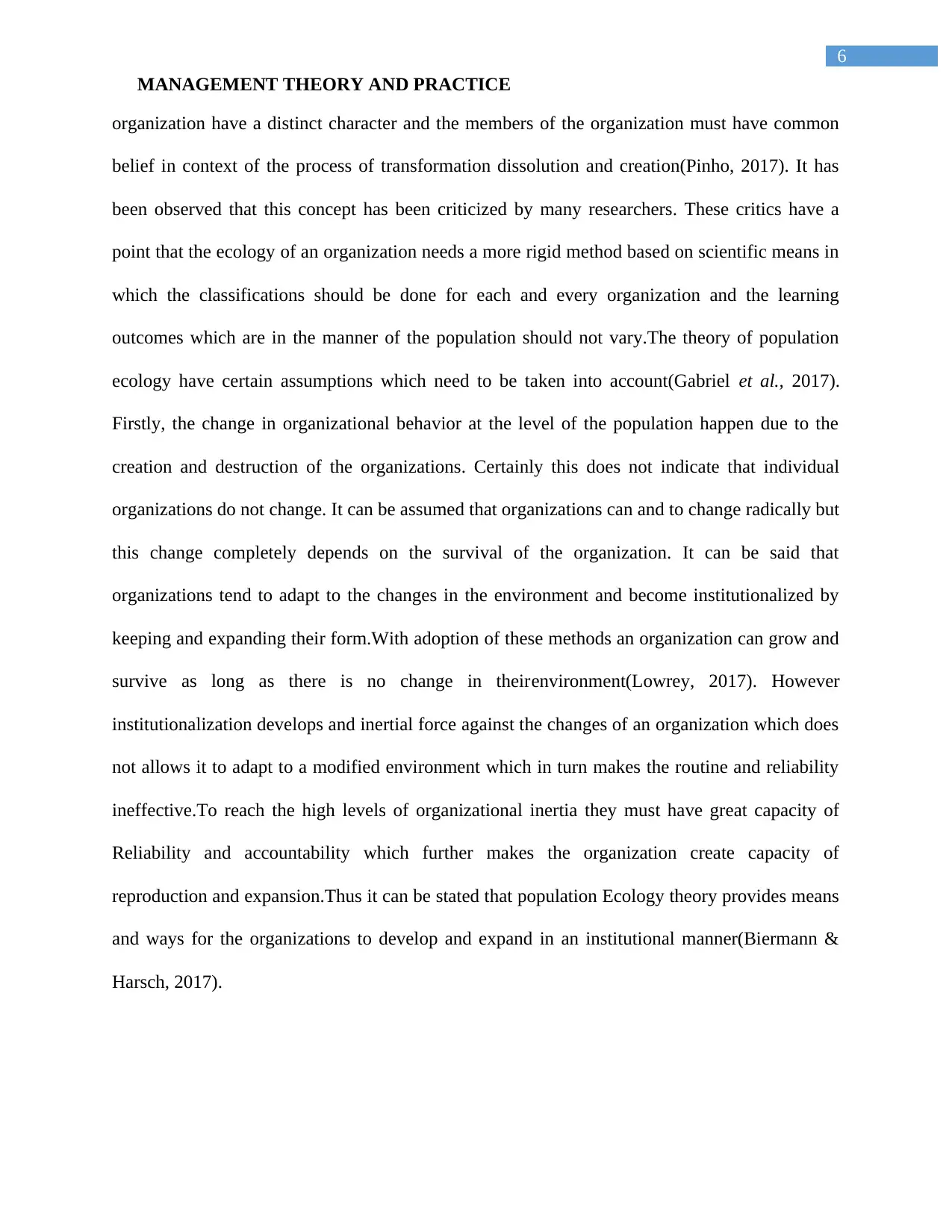
6
MANAGEMENT THEORY AND PRACTICE
organization have a distinct character and the members of the organization must have common
belief in context of the process of transformation dissolution and creation(Pinho, 2017). It has
been observed that this concept has been criticized by many researchers. These critics have a
point that the ecology of an organization needs a more rigid method based on scientific means in
which the classifications should be done for each and every organization and the learning
outcomes which are in the manner of the population should not vary.The theory of population
ecology have certain assumptions which need to be taken into account(Gabriel et al., 2017).
Firstly, the change in organizational behavior at the level of the population happen due to the
creation and destruction of the organizations. Certainly this does not indicate that individual
organizations do not change. It can be assumed that organizations can and to change radically but
this change completely depends on the survival of the organization. It can be said that
organizations tend to adapt to the changes in the environment and become institutionalized by
keeping and expanding their form.With adoption of these methods an organization can grow and
survive as long as there is no change in theirenvironment(Lowrey, 2017). However
institutionalization develops and inertial force against the changes of an organization which does
not allows it to adapt to a modified environment which in turn makes the routine and reliability
ineffective.To reach the high levels of organizational inertia they must have great capacity of
Reliability and accountability which further makes the organization create capacity of
reproduction and expansion.Thus it can be stated that population Ecology theory provides means
and ways for the organizations to develop and expand in an institutional manner(Biermann &
Harsch, 2017).
MANAGEMENT THEORY AND PRACTICE
organization have a distinct character and the members of the organization must have common
belief in context of the process of transformation dissolution and creation(Pinho, 2017). It has
been observed that this concept has been criticized by many researchers. These critics have a
point that the ecology of an organization needs a more rigid method based on scientific means in
which the classifications should be done for each and every organization and the learning
outcomes which are in the manner of the population should not vary.The theory of population
ecology have certain assumptions which need to be taken into account(Gabriel et al., 2017).
Firstly, the change in organizational behavior at the level of the population happen due to the
creation and destruction of the organizations. Certainly this does not indicate that individual
organizations do not change. It can be assumed that organizations can and to change radically but
this change completely depends on the survival of the organization. It can be said that
organizations tend to adapt to the changes in the environment and become institutionalized by
keeping and expanding their form.With adoption of these methods an organization can grow and
survive as long as there is no change in theirenvironment(Lowrey, 2017). However
institutionalization develops and inertial force against the changes of an organization which does
not allows it to adapt to a modified environment which in turn makes the routine and reliability
ineffective.To reach the high levels of organizational inertia they must have great capacity of
Reliability and accountability which further makes the organization create capacity of
reproduction and expansion.Thus it can be stated that population Ecology theory provides means
and ways for the organizations to develop and expand in an institutional manner(Biermann &
Harsch, 2017).
Paraphrase This Document
Need a fresh take? Get an instant paraphrase of this document with our AI Paraphraser
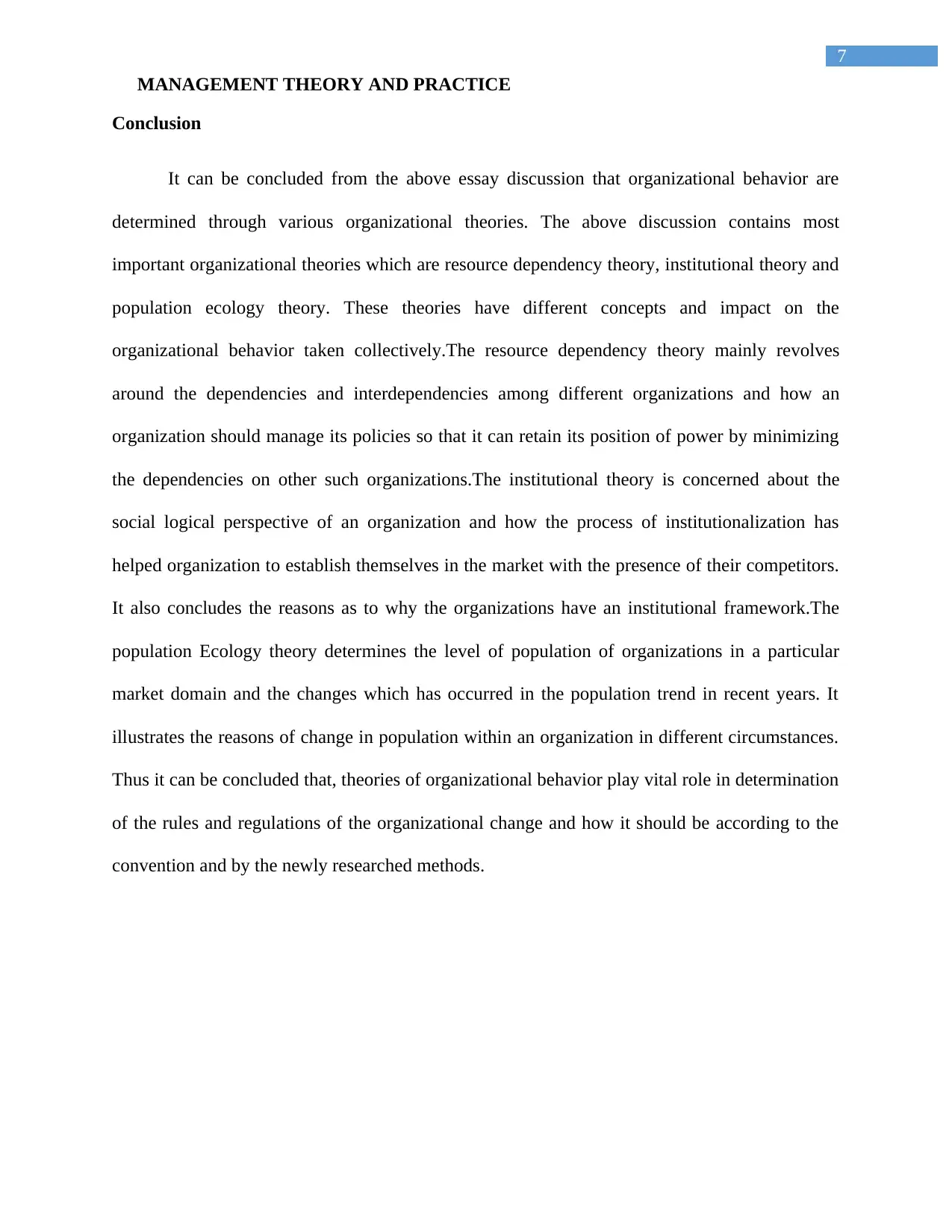
7
MANAGEMENT THEORY AND PRACTICE
Conclusion
It can be concluded from the above essay discussion that organizational behavior are
determined through various organizational theories. The above discussion contains most
important organizational theories which are resource dependency theory, institutional theory and
population ecology theory. These theories have different concepts and impact on the
organizational behavior taken collectively.The resource dependency theory mainly revolves
around the dependencies and interdependencies among different organizations and how an
organization should manage its policies so that it can retain its position of power by minimizing
the dependencies on other such organizations.The institutional theory is concerned about the
social logical perspective of an organization and how the process of institutionalization has
helped organization to establish themselves in the market with the presence of their competitors.
It also concludes the reasons as to why the organizations have an institutional framework.The
population Ecology theory determines the level of population of organizations in a particular
market domain and the changes which has occurred in the population trend in recent years. It
illustrates the reasons of change in population within an organization in different circumstances.
Thus it can be concluded that, theories of organizational behavior play vital role in determination
of the rules and regulations of the organizational change and how it should be according to the
convention and by the newly researched methods.
MANAGEMENT THEORY AND PRACTICE
Conclusion
It can be concluded from the above essay discussion that organizational behavior are
determined through various organizational theories. The above discussion contains most
important organizational theories which are resource dependency theory, institutional theory and
population ecology theory. These theories have different concepts and impact on the
organizational behavior taken collectively.The resource dependency theory mainly revolves
around the dependencies and interdependencies among different organizations and how an
organization should manage its policies so that it can retain its position of power by minimizing
the dependencies on other such organizations.The institutional theory is concerned about the
social logical perspective of an organization and how the process of institutionalization has
helped organization to establish themselves in the market with the presence of their competitors.
It also concludes the reasons as to why the organizations have an institutional framework.The
population Ecology theory determines the level of population of organizations in a particular
market domain and the changes which has occurred in the population trend in recent years. It
illustrates the reasons of change in population within an organization in different circumstances.
Thus it can be concluded that, theories of organizational behavior play vital role in determination
of the rules and regulations of the organizational change and how it should be according to the
convention and by the newly researched methods.
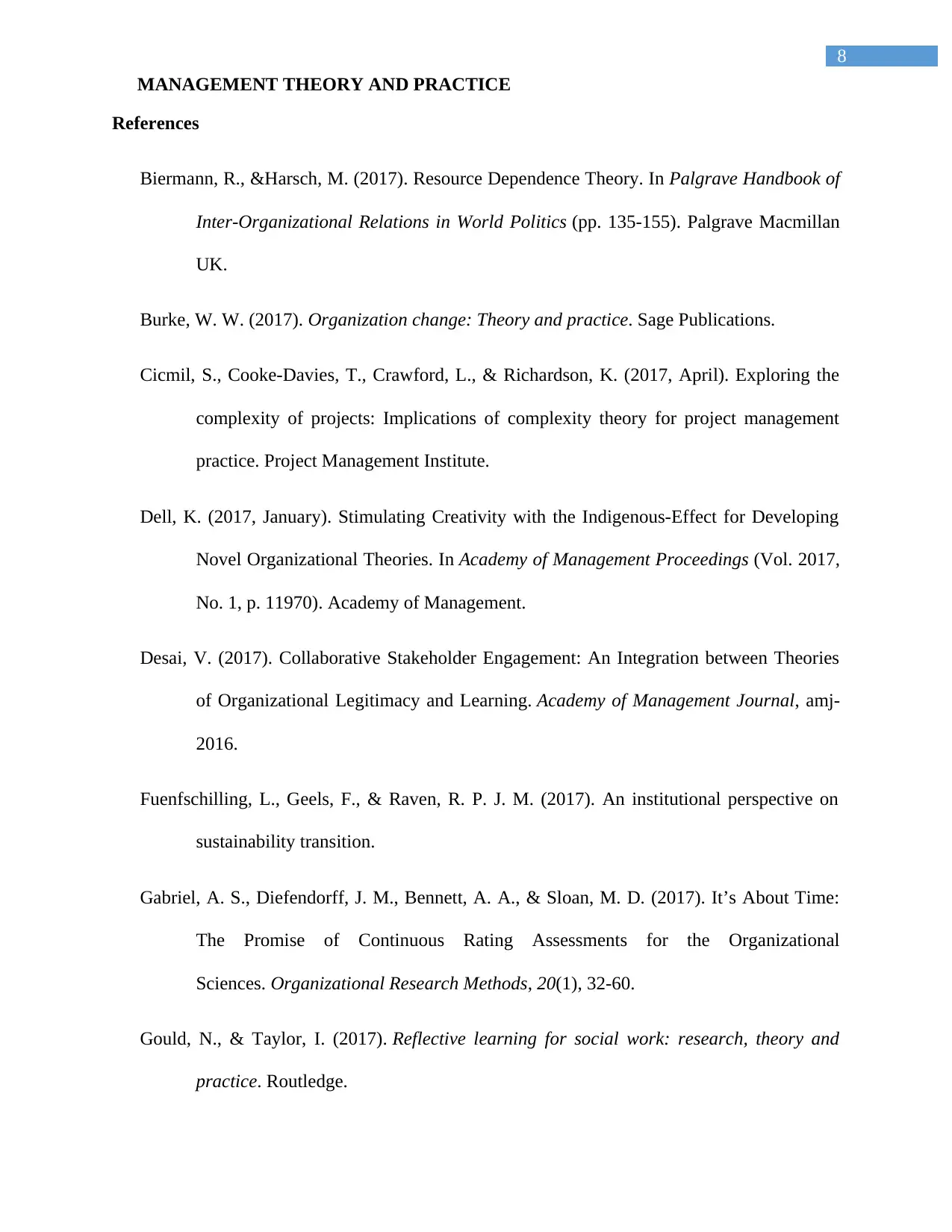
8
MANAGEMENT THEORY AND PRACTICE
References
Biermann, R., &Harsch, M. (2017). Resource Dependence Theory. In Palgrave Handbook of
Inter-Organizational Relations in World Politics (pp. 135-155). Palgrave Macmillan
UK.
Burke, W. W. (2017). Organization change: Theory and practice. Sage Publications.
Cicmil, S., Cooke-Davies, T., Crawford, L., & Richardson, K. (2017, April). Exploring the
complexity of projects: Implications of complexity theory for project management
practice. Project Management Institute.
Dell, K. (2017, January). Stimulating Creativity with the Indigenous-Effect for Developing
Novel Organizational Theories. In Academy of Management Proceedings (Vol. 2017,
No. 1, p. 11970). Academy of Management.
Desai, V. (2017). Collaborative Stakeholder Engagement: An Integration between Theories
of Organizational Legitimacy and Learning. Academy of Management Journal, amj-
2016.
Fuenfschilling, L., Geels, F., & Raven, R. P. J. M. (2017). An institutional perspective on
sustainability transition.
Gabriel, A. S., Diefendorff, J. M., Bennett, A. A., & Sloan, M. D. (2017). It’s About Time:
The Promise of Continuous Rating Assessments for the Organizational
Sciences. Organizational Research Methods, 20(1), 32-60.
Gould, N., & Taylor, I. (2017). Reflective learning for social work: research, theory and
practice. Routledge.
MANAGEMENT THEORY AND PRACTICE
References
Biermann, R., &Harsch, M. (2017). Resource Dependence Theory. In Palgrave Handbook of
Inter-Organizational Relations in World Politics (pp. 135-155). Palgrave Macmillan
UK.
Burke, W. W. (2017). Organization change: Theory and practice. Sage Publications.
Cicmil, S., Cooke-Davies, T., Crawford, L., & Richardson, K. (2017, April). Exploring the
complexity of projects: Implications of complexity theory for project management
practice. Project Management Institute.
Dell, K. (2017, January). Stimulating Creativity with the Indigenous-Effect for Developing
Novel Organizational Theories. In Academy of Management Proceedings (Vol. 2017,
No. 1, p. 11970). Academy of Management.
Desai, V. (2017). Collaborative Stakeholder Engagement: An Integration between Theories
of Organizational Legitimacy and Learning. Academy of Management Journal, amj-
2016.
Fuenfschilling, L., Geels, F., & Raven, R. P. J. M. (2017). An institutional perspective on
sustainability transition.
Gabriel, A. S., Diefendorff, J. M., Bennett, A. A., & Sloan, M. D. (2017). It’s About Time:
The Promise of Continuous Rating Assessments for the Organizational
Sciences. Organizational Research Methods, 20(1), 32-60.
Gould, N., & Taylor, I. (2017). Reflective learning for social work: research, theory and
practice. Routledge.
⊘ This is a preview!⊘
Do you want full access?
Subscribe today to unlock all pages.

Trusted by 1+ million students worldwide
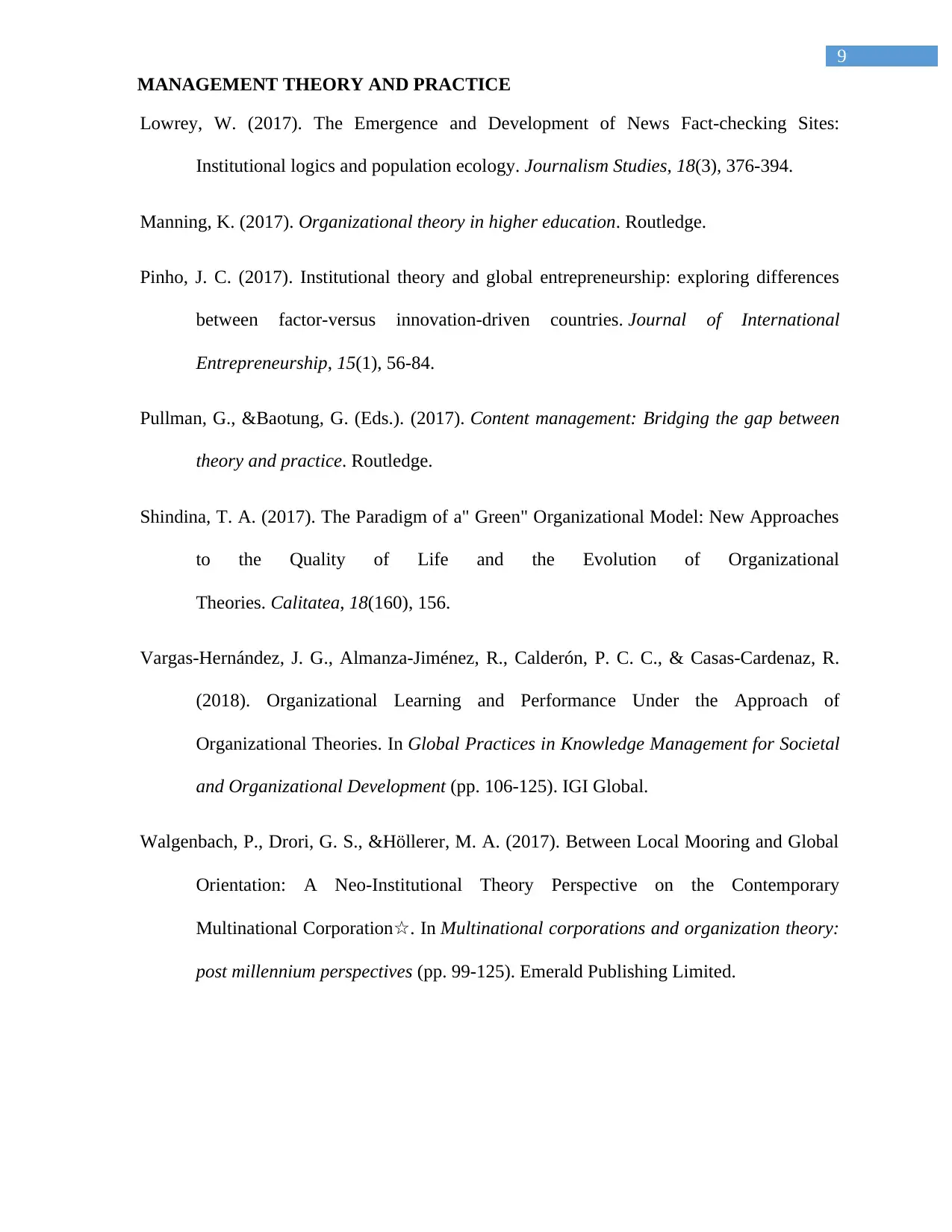
9
MANAGEMENT THEORY AND PRACTICE
Lowrey, W. (2017). The Emergence and Development of News Fact-checking Sites:
Institutional logics and population ecology. Journalism Studies, 18(3), 376-394.
Manning, K. (2017). Organizational theory in higher education. Routledge.
Pinho, J. C. (2017). Institutional theory and global entrepreneurship: exploring differences
between factor-versus innovation-driven countries. Journal of International
Entrepreneurship, 15(1), 56-84.
Pullman, G., &Baotung, G. (Eds.). (2017). Content management: Bridging the gap between
theory and practice. Routledge.
Shindina, T. A. (2017). The Paradigm of a" Green" Organizational Model: New Approaches
to the Quality of Life and the Evolution of Organizational
Theories. Calitatea, 18(160), 156.
Vargas-Hernández, J. G., Almanza-Jiménez, R., Calderón, P. C. C., & Casas-Cardenaz, R.
(2018). Organizational Learning and Performance Under the Approach of
Organizational Theories. In Global Practices in Knowledge Management for Societal
and Organizational Development (pp. 106-125). IGI Global.
Walgenbach, P., Drori, G. S., &Höllerer, M. A. (2017). Between Local Mooring and Global
Orientation: A Neo-Institutional Theory Perspective on the Contemporary
Multinational Corporation☆. In Multinational corporations and organization theory:
post millennium perspectives (pp. 99-125). Emerald Publishing Limited.
MANAGEMENT THEORY AND PRACTICE
Lowrey, W. (2017). The Emergence and Development of News Fact-checking Sites:
Institutional logics and population ecology. Journalism Studies, 18(3), 376-394.
Manning, K. (2017). Organizational theory in higher education. Routledge.
Pinho, J. C. (2017). Institutional theory and global entrepreneurship: exploring differences
between factor-versus innovation-driven countries. Journal of International
Entrepreneurship, 15(1), 56-84.
Pullman, G., &Baotung, G. (Eds.). (2017). Content management: Bridging the gap between
theory and practice. Routledge.
Shindina, T. A. (2017). The Paradigm of a" Green" Organizational Model: New Approaches
to the Quality of Life and the Evolution of Organizational
Theories. Calitatea, 18(160), 156.
Vargas-Hernández, J. G., Almanza-Jiménez, R., Calderón, P. C. C., & Casas-Cardenaz, R.
(2018). Organizational Learning and Performance Under the Approach of
Organizational Theories. In Global Practices in Knowledge Management for Societal
and Organizational Development (pp. 106-125). IGI Global.
Walgenbach, P., Drori, G. S., &Höllerer, M. A. (2017). Between Local Mooring and Global
Orientation: A Neo-Institutional Theory Perspective on the Contemporary
Multinational Corporation☆. In Multinational corporations and organization theory:
post millennium perspectives (pp. 99-125). Emerald Publishing Limited.
Paraphrase This Document
Need a fresh take? Get an instant paraphrase of this document with our AI Paraphraser
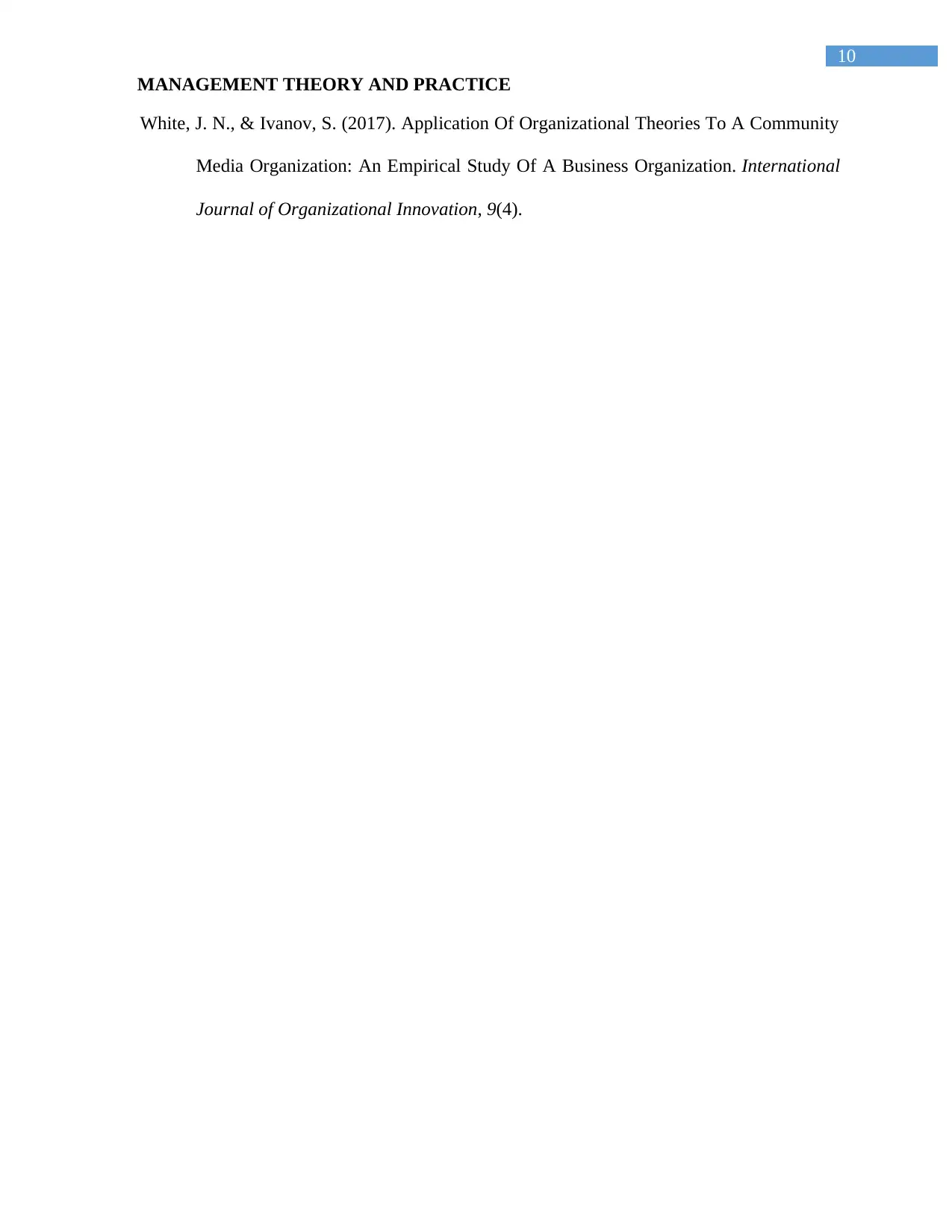
10
MANAGEMENT THEORY AND PRACTICE
White, J. N., & Ivanov, S. (2017). Application Of Organizational Theories To A Community
Media Organization: An Empirical Study Of A Business Organization. International
Journal of Organizational Innovation, 9(4).
MANAGEMENT THEORY AND PRACTICE
White, J. N., & Ivanov, S. (2017). Application Of Organizational Theories To A Community
Media Organization: An Empirical Study Of A Business Organization. International
Journal of Organizational Innovation, 9(4).
1 out of 11
Related Documents
Your All-in-One AI-Powered Toolkit for Academic Success.
+13062052269
info@desklib.com
Available 24*7 on WhatsApp / Email
![[object Object]](/_next/static/media/star-bottom.7253800d.svg)
Unlock your academic potential
Copyright © 2020–2026 A2Z Services. All Rights Reserved. Developed and managed by ZUCOL.


